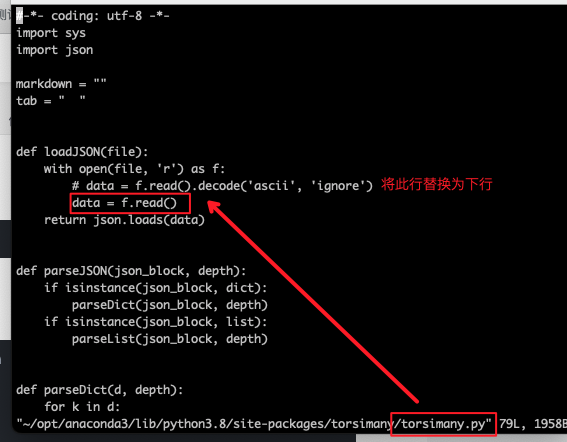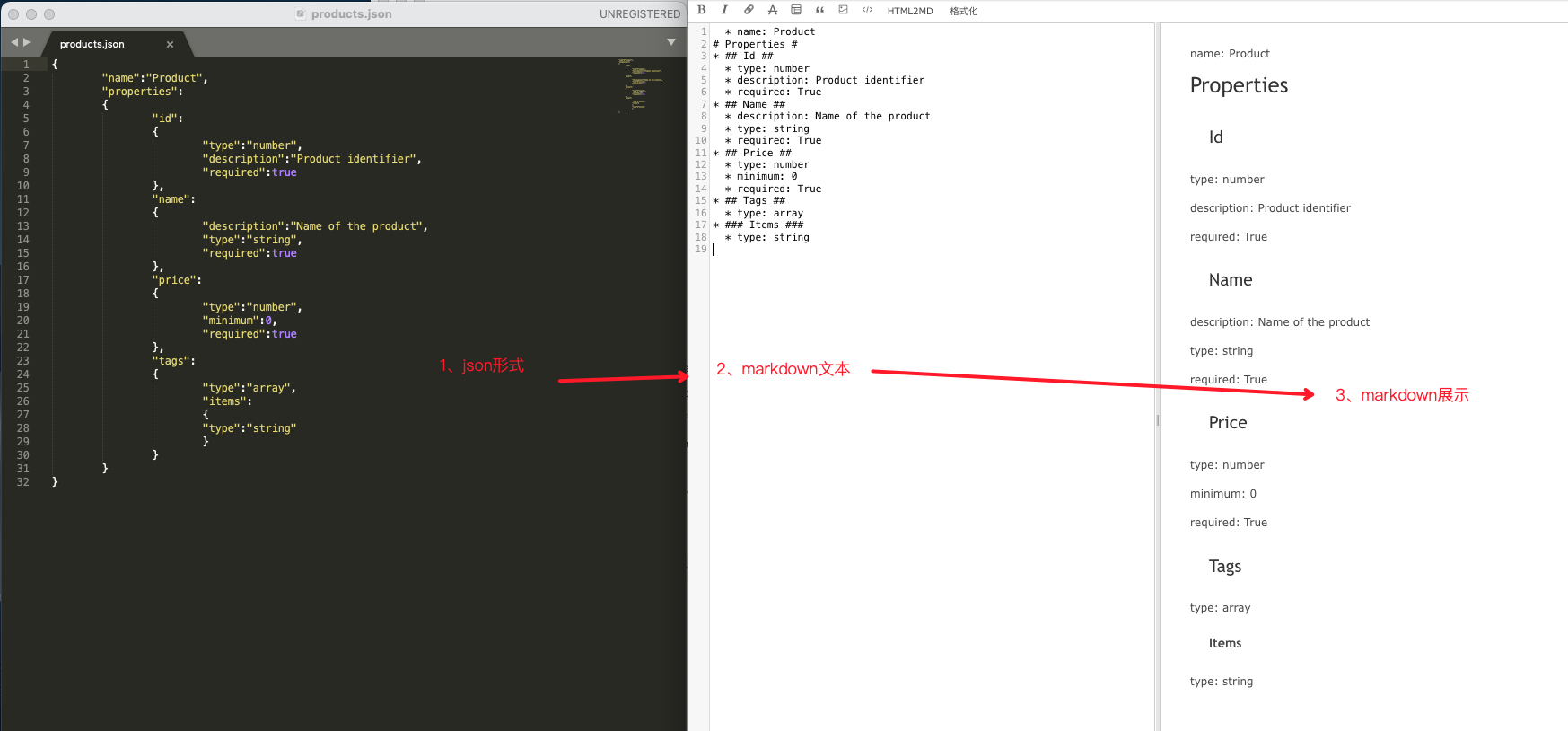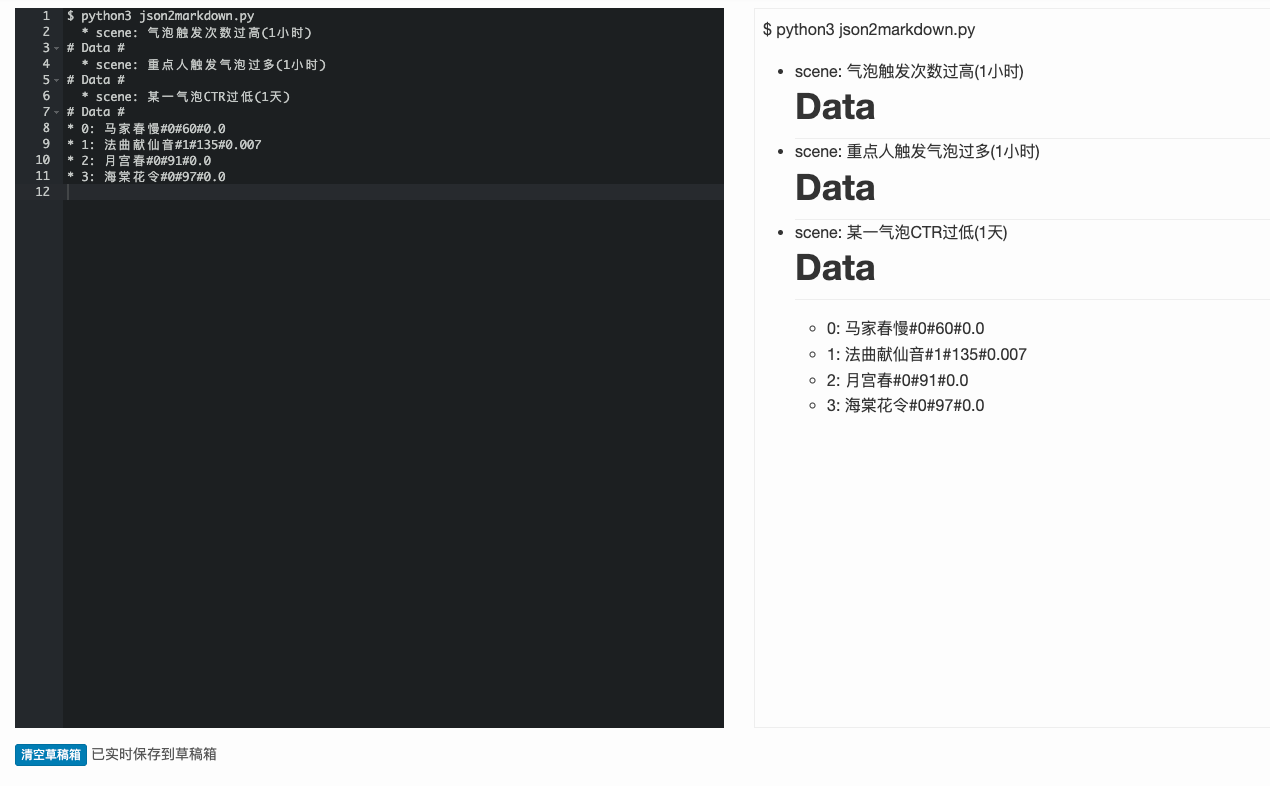目录
因为一些特殊场景的需要,需要将接口的json返回渲染成markdown形式,自己处理的话还挺麻烦的,俗话说的好:站在巨人的肩膀上。下面介绍了基于Python的Json与Markdown互相转换的方式,当然你可以在Github上多搜搜看看其它的方案。
一、Json转Markdown
1、原始torsimany库
https://github.com/PolBaladas/torsimany
安装依赖库:torsimany
pip3 install torsimany使用方式:
python3 torsimany.py [JSON_FILE].json
或者
torsimany [JSON_FILE].json假设我们有个Json格式文件:products.json,内容如下:
{
"name":"Product",
"properties":
{
"id":
{
"type":"number",
"description":"Product identifier",
"required":true
},
"name":
{
"description":"Name of the product",
"type":"string",
"required":true
},
"price":
{
"type":"number",
"minimum":0,
"required":true
},
"tags":
{
"type":"array",
"items":
{
"type":"string"
}
}
}
}我们在终端执行如下命令,将其转化为Markdown格式文件:
torsimany products.json如果在Python3报错:AttributeError: 'str' object has no attribute 'decode'
解决方法:可以尝试修改下安装包对应的文件:./site-packages/torsimany/torsimany.py,修改内容如下:
预期成功的话,会在当前目录生成:products.markdown文件,也就是markdown形式的文件,内容如下:
* name: Product
# Properties #
* ## Id ##
* type: number
* description: Product identifier
* required: True
* ## Name ##
* description: Name of the product
* type: string
* required: True
* ## Price ##
* type: number
* minimum: 0
* required: True
* ## Tags ##
* type: array
* ### Items ###
* type: string
我们通过Markdown在线工具查看效果,大概如下:
2、torsimany库修改
上述的torsimany库默认只支持文件形式的转换,其实我们日常用的比较多的是直接在线转换json文件为mardkdown的形式,于是对上面的实现进行了一些简单的改动,其实也比较简单,就一个文件,json2markdown.py
# -*- coding: UTF-8 -*-
"""
@Function:json to markdown
@Time : 2022/6/15 09:45
@Auth : https://github.com/PolBaladas/torsimany/blob/master/torsimany/torsimany.py
"""
import sys
import json
class Json2Markdown(object):
"""
# json转markdown形式
"""
def __init__(self):
self.markdown = ""
self.tab = " "
self.list_tag = '* '
self.htag = '#'
def loadJSON(self, file):
"""
:param file:
:return:
"""
with open(file, 'r') as f:
data = f.read()
return json.loads(data)
def parseJSON(self, json_block, depth):
"""
:param json_block:
:param depth:
:return:
"""
if isinstance(json_block, dict):
self.parseDict(json_block, depth)
if isinstance(json_block, list):
self.parseList(json_block, depth)
def parseDict(self, d, depth):
"""
:param d:
:param depth:
:return:
"""
for k in d:
if isinstance(d[k], (dict, list)):
self.addHeader(k, depth)
self.parseJSON(d[k], depth + 1)
else:
self.addValue(k, d[k], depth)
def parseList(self, l, depth):
"""
:param l:
:param depth:
:return:
"""
for value in l:
if not isinstance(value, (dict, list)):
index = l.index(value)
self.addValue(index, value, depth)
else:
self.parseDict(value, depth)
def buildHeaderChain(self, depth):
"""
:param depth:
:return:
"""
chain = self.list_tag * (bool(depth)) + self.htag * (depth + 1) + \
' value ' + (self.htag * (depth + 1) + '\n')
return chain
def buildValueChain(self, key, value, depth):
"""
:param key:
:param value:
:param depth:
:return:
"""
chain = self.tab * (bool(depth - 1)) + self.list_tag + \
str(key) + ": " + str(value) + "\n"
return chain
def addHeader(self, value, depth):
"""
:param value:
:param depth:
:return:
"""
chain = self.buildHeaderChain(depth)
self.markdown += chain.replace('value', value.title())
def addValue(self, key, value, depth):
"""
:param key:
:param value:
:param depth:
:return:
"""
chain = self.buildValueChain(key, value, depth)
self.markdown += chain
def json2markdown(self, json_data):
"""
:param json_data:
:return:
"""
depth = 0
self.parseJSON(json_data, depth)
self.markdown = self.markdown.replace('#######', '######')
return self.markdown
if __name__ == '__main__':
json_data = [
{
"scene": "气泡触发次数过高(1小时)",
"data": [
]
},
{
"scene": "重点人触发气泡过多(1小时)",
"data": [
]
},
{
"scene": "某一气泡CTR过低(1天)",
"data": [
"马家春慢#0#60#0.0",
"法曲献仙音#1#135#0.007",
"月宫春#0#91#0.0",
"海棠花令#0#97#0.0"
]
}
]
# 实例
json2markdown_ins = Json2Markdown()
# json转markdown
markdown_data = json2markdown_ins.json2markdown(json_data)
print(markdown_data)试运行下,结果如下:
$ python3 json2markdown.py
* scene: 气泡触发次数过高(1小时)
# Data #
* scene: 重点人触发气泡过多(1小时)
# Data #
* scene: 某一气泡CTR过低(1天)
# Data #
* 0: 马家春慢#0#60#0.0
* 1: 法曲献仙音#1#135#0.007
* 2: 月宫春#0#91#0.0
* 3: 海棠花令#0#97#0.0
通过Markdown在线工具看下转换后的markdown数据:
二、Markdown转Json
https://github.com/njvack/markdown-to-json
安装依赖库:markdown-to-json
pip3 install markdown-to-json使用方法:
$ md_to_json -h
Translate markdown into JSON.
Usage:
md_to_json [options] <markdown_file>
md_to_json -h | --help
Options:
-h --help Show this screen
--version Print version number
-o <file> Save output to a file instead of stdout
-i <val> Indent nested JSON by this amount. Use a negative number for
most compact possible JSON. the [default: 2]我们以products.markdown文件为例(上文生成的),命令如下,当然也可以通过-o指定写入到生成的文件。
$ md_to_json products1.markdown
# 输出结果
{
"Properties": [
"Id",
[
"type: number",
"description: Product identifier",
"required: True"
],
"Name",
[
"description: Name of the product",
"type: string",
"required: True"
],
"Price",
[
"type: number",
"minimum: 0",
"required: True"
],
"Tags",
[
"type: array"
],
"Items",
[
"type: string"
]
]
}